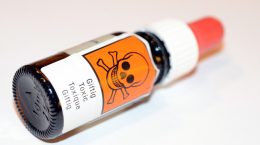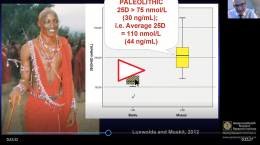Published on October 14, 2024
Learn from one of the world’s leading experts on vitamin D toxicity, Dr. Reinhold Vieth!
Key Points
- YES, vitamin D is used as a rat poison. However, “the dose makes the poison….” In other words, for vitamin D: “Vitamin D is not inherently toxic, but like anything that actually works, too much of it will be harmful.”
- Around 32 ng/ml of vitamin D is the point at which calcium homeostasis becomes optimized and additional vitamin D will not make any difference for calcium absorption – at this point “It’s stable, the way it’s supposed to be in a regulated system.” Around 102 ng/ml vitamin D is the point at which the first evidence exists that the higher vitamin D level is driving increased calcium absorption, however, this is not yet toxic.
- In this presentation, Dr. Reinhold Vieth discusses the basic science, clinical evidence, and the politics surrounding official committee guidelines related to the risks and benefits of vitamin D
The following presentation, Vitamin D “Toxicity,” was given by Dr. Reinhold Vieth, PhD, at the University of Minnesota on Sept. 18, 2024. In this presentation, Dr. Vieth discusses the basic science, clinical evidence, and the politics surrounding official committee guidelines related to the risks and benefits of vitamin D.
Dr. Vieth also reviews the hormonal role of vitamin D and its responsibility of maintaining calcium homeostasis. He illustrates how and at what point increasing vitamin D levels can increase the risk of hypercalcemia, and therefore, vitamin D toxicity. He also reviews the pharmacology of vitamin D; how vitamin D is metabolized, the different forms of vitamin D within the body, and the conversion processes. Several cases of vitamin D toxicity are discussed to demonstrate the difficulty of achieving true vitamin D deficiency, and vitamin D safety is covered via a review published clinical studies.
YES, vitamin D is used as a rat poison. However, “the dose makes the poison….” In other words, for vitamin D: “Vitamin D is not inherently toxic, but like anything that actually works, too much of it will be harmful.”
Learn more by watching this recorded lecture by Dr. Vieth. Click through directly to specific topics below.
The opinions included in this video are those of the presenter and are intended for a professional, academic audience.
Watch the Video
Key Points from the Video
04:08 – How does vitamin D affect calcium levels? A review of the hormonal functions of vitamin D.
07:03 – The Evolution of Skin Color: The relationship between skin color, sun exposure, and vitamin D for survival.
12:42 – The Pharmacology of Vitamin D: Vitamin D conversion and use within the body.
21:27 – A Case Study of Vitamin D Toxicity: What did it take for this father and son to reach toxic levels?
27:28 – What is hypercalcemia, and when can it be attributed to vitamin D toxicity?
33:39 – Current Vitamin D Guidelines versus Practical Clinical Data: What should be considered safe levels?
38:52 – What type of evidence exists to support higher vitamin D levels? Study type matters…
46:05 – Vitamin D: An Urgent Need for Reform. Why is there so much confusion around vitamin D?
Watch the Full Video Here
Watch Additional Presentations from our Ongoing Forum Here
Measure Your Levels of Vitamin D, Magnesium, and Other Important Nutrients and Markers
 Having and maintaining healthy vitamin D, magnesium, omega-3s, zinc and other nutrient levels can help improve your health now and for your future. Choose which to measure, such as your vitamin D, omega-3s, and essential minerals including magnesium and zinc, by creating your custom home test kit today. Take steps to improve the status of each of these measurements to benefit your overall health. You can also track your own intakes, symptoms and results to see what works best for YOU.
Having and maintaining healthy vitamin D, magnesium, omega-3s, zinc and other nutrient levels can help improve your health now and for your future. Choose which to measure, such as your vitamin D, omega-3s, and essential minerals including magnesium and zinc, by creating your custom home test kit today. Take steps to improve the status of each of these measurements to benefit your overall health. You can also track your own intakes, symptoms and results to see what works best for YOU.
Enroll and test your levels today, learn what steps to take to improve your status of vitamin D (see below) and other nutrients and blood markers, and take action! By enrolling in the GrassrootsHealth projects, you are not only contributing valuable information to everyone, you are also gaining knowledge about how you could improve your own health through measuring and tracking your nutrient status, and educating yourself on how to improve it.





